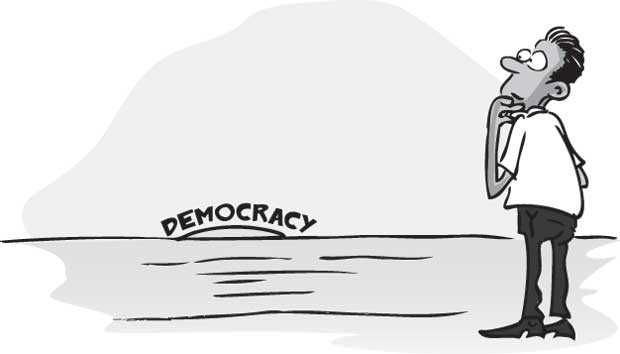Reply To:
Name - Reply Comment

Rays of hope flicker across the sky as a new Sri Lanka - committed to good governance, democracy and social justice - prepares for a simple celebration to mark the 67th anniversary of Sri Lanka’s Independence on Thursday.
President Maithripala Sirisena, in a 90-minute interview with State Television on Saturday night, declared again he had no intention of becoming a king like Parakramabahu or Dutugemunu, but would be the chief servant leader of the people of Sri Lanka. As a major step towards this, the President said he was committing himself to a simple and humble lifestyle and he hoped other Government leaders, politicians and top officials would follow in his footsteps and lead by example.
President Sirisena who heads the all-party National Unity Government along with Prime Minister Ranil Wickremesinghe, pointed out that in the interim Budget presented last Thursday, he had asked that the allocations for the Presidential Secretariat be slashed from a staggering Rs. 10,000 million to a mere Rs 272 million. The money saved was being used to substantially reduce the cost of living and provide other relief measures to the suffering people. In an interview that was acclaimed as the most hopeful mission and vision proclaimed by a Sri Lankan leader, Mr. Sirisena said the Presidential Security Division had been slashed from more than 4000 to about 1000 while the number of vehicles in the PSD and for his security would be reduced to a bare minimum. President Sirisena, beginning his fourth week in the still the all powerful Executive Presidency, said he was now personally aware of the absolute powers and was fearful of the dangerous consequences when these powers were abused, as we saw from 1978 and specially after 2010.
Disclosing some shocking details of wasteful expenditure and luxury living he said there were about 10 Presidential Palaces in different parts of the country and their daily food bill alone was about Rs. 170 million. Mr. Sirisena said he had no intention of occupying any of these palaces and would continue to occupy his private residence and work from the Presidential Secretariat. Only State functions for visiting VIPs would be held at the President’s House in Colombo.
Besides the commitment to a simple lifestyle so that Sri Lanka could save more and bring about poverty alleviation through a more equitable distribution of wealth and resources, President Sirisiena reiterated his commitment to democracy and good governance. He said he had wanted only one four-year term, but other leaders in the National Executive Council had urged him to agree to a five-year term because Sri Lanka could not afford to hold a Presidential Election every four years though rich countries like the United States did so.
Explaining the mission and new political culture of the all-party National Unity Government, President Sirisena explained how and why he agreed to become the Chairman of the Sri Lanka Freedom Party (SLFP). He disclosed that a week after his inauguration, top officials of the SLFP had met him and said former President Mahinda Rajapaksa was ready to give up the party leadership also but wanted to see Mr. Sirisena before that. The President agreed and he met Mahinda Rajapaksa at Speaker Chamal Rajapaksa’s residence in Colombo with the Speaker also present. After a meeting that lasted only 10 minutes, Mahinda Rajapaksa asked him whether he could take charge of the party. He said he could and the next day the SLFP Central Committee elected him as the leader.
President Sirisena said this was the first time Sri Lanka had an all-party Government including the UNP and the SLFP, the TNA and the SLMC, the JHU, other parties and a number of civic action groups with the JVP giving strong support to the Government though it has not accepted any cabinet portfolios. President Sirisena said the silent rainbow revolution of the people on January 8 had ushered in a new era of multi-racial, multi-religious and multi-party unity in diversity. He was hopeful that the Government could build a new Sri Lanka with much being achieved through the 100-day programme, while he wished the new covenant would continue for at least two more years to build lasting peace and sustainable development.